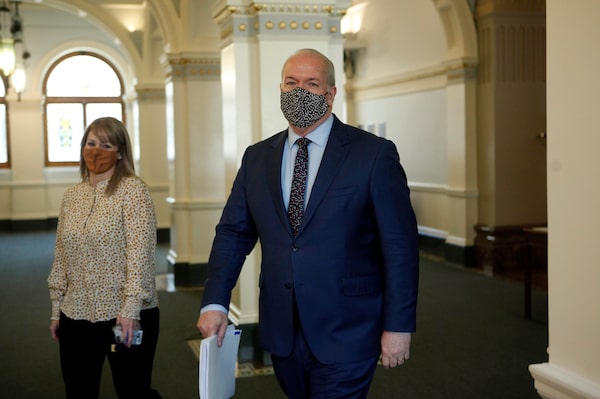
British Columbia Premier John Horgan arrives before the budget speech from the legislative assembly at Legislature in Victoria, April 20, 2021.CHAD HIPOLITO/The Canadian Press
New rules expected Friday aimed at limiting travel within British Columbia have prompted concerns from civil rights groups about police overreach and worries from the tourism industry about another economic battering as the provincial government battles the third wave of COVID-19 infections.
Premier John Horgan announced Monday that starting Friday, people could face a fine for non-essential travel outside their local health authority, with checkpoints across the province. Hotels, campgrounds and BC Ferries have been told to expect new rules about whom they can accommodate.
Mr. Horgan pledged the changes would not disproportionately affect racialized people and he brushed aside comparisons between his plan and one in Ontario that was harshly criticized. Premier Doug Ford’s government reversed course last weekend on granting sweeping new police powers.
Lama Mugabo, a board member at Vancouver’s Hogan’s Alley Society, said he would argue in favour of new rules to manage the pandemic, but the province is also in the middle of the fight against systemic racism in policing.
“I’m really concerned about the track record of the police, RCMP against people of colour and how they’re going to be protected,” he said.
Harsha Walia, executive director of the BC Civil Liberties Association, said the new measures appear to give police more enforcement powers to ask people many invasive questions.
“Will the police have a range of policing powers? Or will they now be authorized to ask questions like, where are you going? Where are you coming from? Will they have the authority to ask for proof if they decide?” she said.
Mr. Mugabo said he’s encouraged that Mr. Horgan said he will be consulting with the Black, Indigenous and people of colour (BIPOC) community, but his group has not yet been contacted.
The B.C. plan is to conduct road checks similar to those used to detect drunk drivers.
B.C. RCMP Staff Sergeant Janelle Shoihet said the force will be working with the provincial government to determine the way forward. She said an announcement will be made later this week. Vancouver Police Sergeant Steve Addison said his force has not yet seen any specific details about the pending travel restrictions.
The new measures, which will be effective at least until the end of the May 24 long weekend, also include cancelling campground reservations for people travelling from outside the health authority and not allowing B.C. Ferries to make reservations for recreational vehicles.
Graeme Johnston, provincial president of B.C. Ferries and Marine Workers Union, anticipates a significant drop in traffic till the May long weekend, which is traditionally a fairly busy time. “The provincial health officer has not prioritized ferry workers for vaccines ... coupled with the abuse we anticipate from public who are trying to use our services for non-essential travel, it seems like it’s going to be an unpleasant few weeks.”
Charles McDiarmid, managing director of Wickaninnish Inn in Tofino, said his resort has been closed since last November and will remain so until May 25. The Inn’s plan after that is to run no more than 40 per cent of occupancy and gradually increase it as per health orders.
“The expenses are high and revenue is very low … I hope once we reopen, we will be able to stay open because the B.C. government did say by June 25, they expect 60 per cent of the population of the province to have had the first shot of the vaccine,” he said.
Mr. Horgan said Public Safety Minister Mike Farnworth will be issuing orders on Friday under the Emergency Program Act to restrict a person’s ability to leave their health care authority district.
Lawyer Michael Feder said the Emergency Program Act gives the government broad powers to address emergencies, but constitutional questions remain. He added that the Constitution affords everyone mobility rights subject to reasonable limits.
“If it’s reasonable to restrict people travelling from Alberta to B.C. to go golfing, or to visit friends, equally, I would think it’s reasonable to restrict people travelling within B.C. to do the same things.”
We have a weekly Western Canada newsletter written by our B.C. and Alberta bureau chiefs, providing a comprehensive package of the news you need to know about the region and its place in the issues facing Canada. Sign up today.